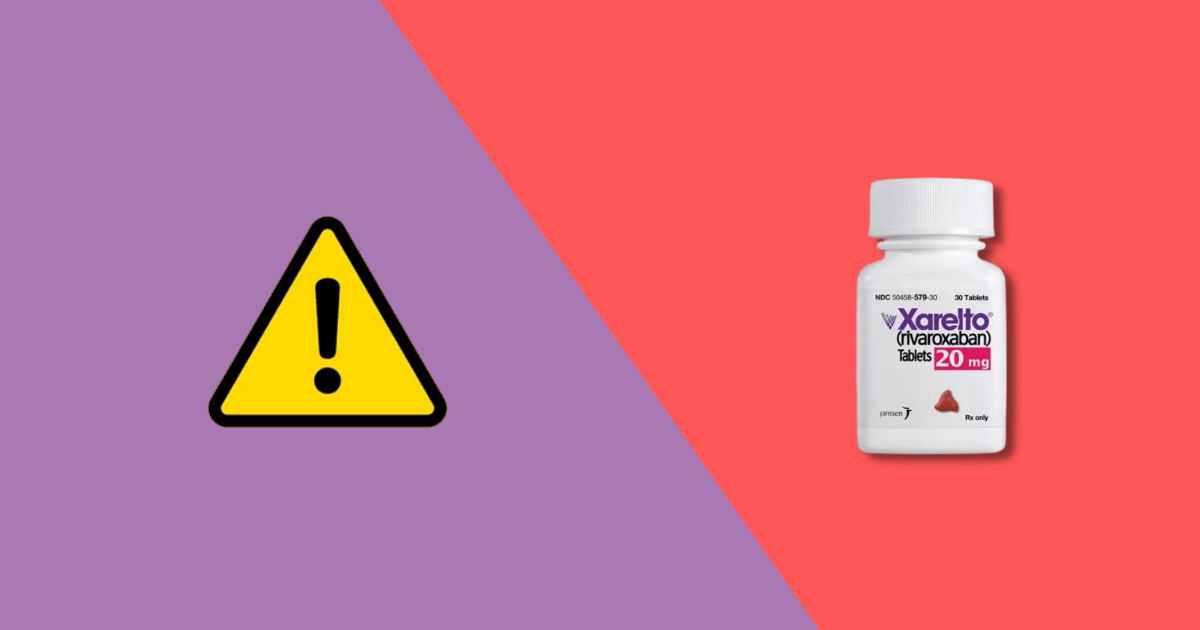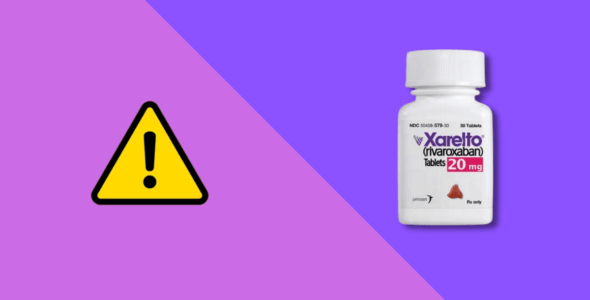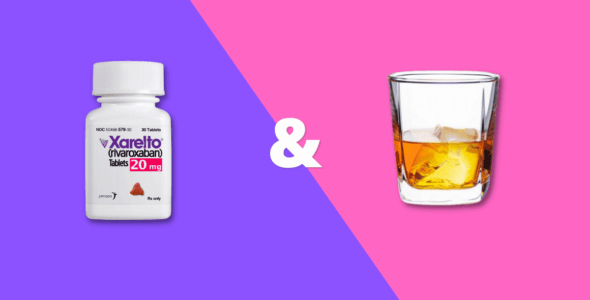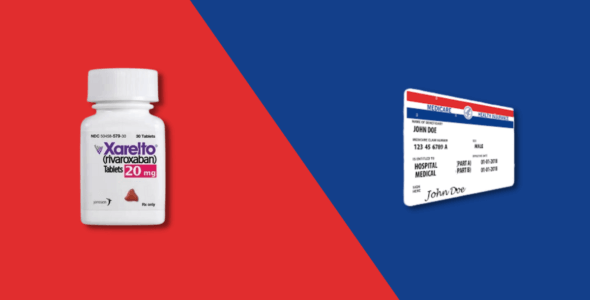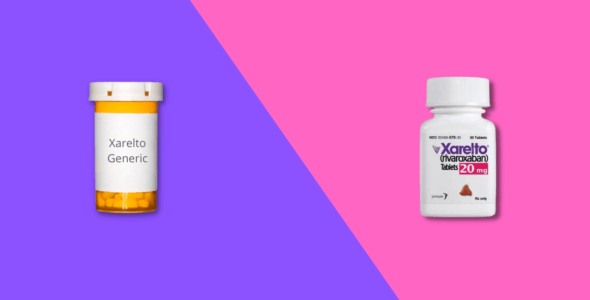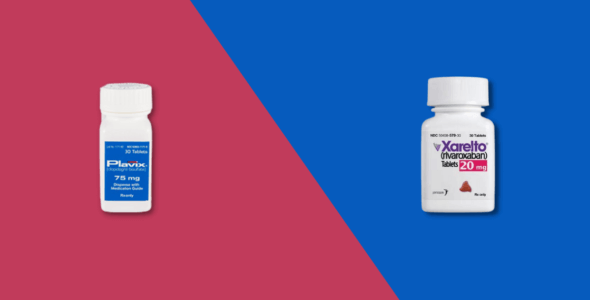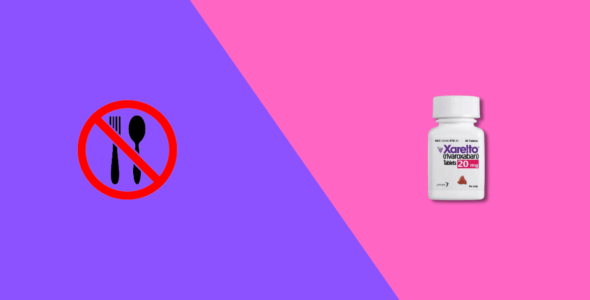Side effects of Xarelto in the elderly
Table of contents
Xarelto is a brand-name medication manufactured by Janssen Pharmaceuticals, Inc. It is classed as an oral anticoagulant and used to treat deep vein thrombosis (DVT) and pulmonary embolism (PE). While Xarelto is generally well tolerated, there are some potential side effects that people should be aware of. The most common side effects of Xarelto include indigestion, muscle pain, and diarrhea. Less common, but more serious side effects, can include severe allergic reactions and an increased risk of bleeding.
Learn more about the side effects of Xarelto in the elderly and what you can do to avoid them.
What is Xarelto (rivaroxaban)?
Xarelto (rivaroxaban) is an FDA-approved (Food and Drug Administration) prescription blood thinner (anticoagulant) medication used to treat deep vein thrombosis (DVT) and pulmonary embolism (PE). It’s used to reduce the risk of DVT and PE recurring. Xarelto belongs to a class of medications called Factor Xa inhibitors which reduce the chance of blood clots happening and also reduce the risk of coronary heart disease and peripheral artery disease. It’s prescribed specifically to:
- Reduce the chances of a blood clot forming in people who have a condition called atrial fibrillation (if it’s not caused by a heart valve problem)
- Reduce the chances of a blood clot forming and causing deep vein thrombosis or a pulmonary embolism
- Reduce the chances of a blood clot forming again in people who are at risk of blood clots after having been treated for them for at least six months
- Reduce the chances of a blood clot forming in people who have had knee replacement surgery
- Reduce the chances of a blood clot forming in people who have reduced mobility and may lie or sit still for long periods. This is usually after someone is hospitalized for an acute illness or major surgery, and as they recuperate after they’ve been discharged
- Reduce the risk of serious cardiovascular problems, heart attacks, or strokes in people with coronary artery disease
- Reduce the risk of serious heart problems, heart attacks, or strokes in people with peripheral artery disease
You may also be prescribed Xarelto if you have coronary artery disease or peripheral artery disease. The active ingredient in Xarelto is called rivaroxaban. It’s an anticoagulant drug, also called a blood thinner, that reduces the likelihood of clots forming in your blood.
When you take Xarelto, rivaroxaban is absorbed into your blood. It attaches itself to and blocks an enzyme in your blood, called Factor Xa. This enzyme controls a step in the clotting process, and by blocking it, rivaroxaban makes it less likely your blood will clot.
Always check with your doctor or pharmacist before taking any medication, including Xarelto, to make sure it is safe for you.
Why are blood thinners prescribed to elderly patients?
Older adults may be more likely to have medical conditions that may need them to take Xarelto. Conditions may include:
- Nonvalvular atrial fibrillation
- Deep vein thrombosis (DVT)
- Pulmonary embolism
- Coronary artery disease – can cause an increased risk of stroke or heart attack
- Peripheral artery disease
- Knee or hip replacement surgery
Xarelto dosage
Xarelto is available in two different oral tablet strengths:
- Xarelto 2.5mg – white, oblong-shaped tablets with “BAYER” on one side and “2.5” on the other side.
- Xarelto 10mg – white, round tablets with “BAYER” on one side and “10” on the other side.
- Xarelto 15 mg – these are white, round tablets debossed with “15” on one side and plain on the other side.
- Xarelto 20 mg – these are yellow, round tablets debossed with “20” on one side and plain on the other side.
For additional safety information, read the full prescribing information and medication guide. Always speak with a healthcare professional for medical advice or about any changes to your dose so they can monitor and evaluate your condition.
What are the side effects of Xarelto in the elderly?
The most common side effects of Xarelto in clinical trials include:
- Nosebleeds
- Indigestion
- Muscle pain
- Stomach pain or discomfort
- Diarrhea
Xarelto can cause more serious side effects, especially for older patients including:
- Severe allergic reactions to the medication
- An increased bleeding risk that won’t stop, like a hemorrhage (bleeding from a ruptured blood vessel)
- An increased risk of spinal or epidural hematoma (bleeding and blood clots in your spine) in patients who take Xarelto and who receive a spinal puncture or local anesthetic injection around their spine – this could result in paralysis
- Liver damage and hepatitis (inflammation in your liver)
If you experience any of these serious side effects, stop taking Xarelto and seek medical attention immediately. Serious side effects may indicate gastrointestinal bleeding, and intracranial hemorrhage (bleeding in the brain). These types of bleeding incidences are more common in elderly patients. You are encouraged to report adverse events of prescription drugs to the FDA. Visit www.fda.gov/medwatch, or call 1-800-FDA-1088.
Xarelto drug interactions
Xarelto can interact with other medications including:
- Any other oral anticoagulants such as apixaban, dabigatran, or rivaroxaban
- Aspirin or aspirin-containing products
- Non-steroidal anti-inflammatory drugs (NSAIDs), like ibuprofen or naproxen
- Any other medications or supplements that can increase your risk of bleeding, including any medications that contain warfarin or heparin
- Any selective serotonin reuptake inhibitor (SSRI) or serotonin-norepinephrine reuptake inhibitor (SNRI) antidepressants
- Any medications taken to treat fungal infections, particularly ketoconazole
- Any antibiotics taken to treat a bacterial infection, particularly erythromycin or rifampicin
- Any HIV/AIDS medications, particularly ritonavir
- Any medications taken to treat seizures, particularly phenytoin or carbamazepine
- An herbal supplement called St John’s Wort
Before taking Xarelto, be sure to tell your doctor about all of the medications you are taking to ensure they are safe to take at the same time.
Xarelto warnings & precautions
You should not take Xarelto if you have certain risk factors such as if you:
- Are allergic to rivaroxaban or any other ingredients in the medication
- Are pregnant or planning to become pregnant
- Are breastfeeding or planning to breastfeed
- Have had a recent spinal puncture or epidural catheter placement
- Have an active internal bleeding disorder
Talk to your doctor before taking Xarelto if you:
- Have or have had bleeding problems
- Have liver disease
- Have renal impairment
- Are scheduled to have surgery
- Are 65 years of age or older
- Are taking any medications that could increase your risk of bleeding, including any medications that contain warfarin or heparin
- Are taking any SSRI or SNRI antidepressants
- Are taking any medications
You should always check with your doctor or pharmacist before taking any medication, including Xarelto, to make sure it is safe for you.
The risk of bleeding may be higher if you have a deformed spine, or have had spinal procedures/surgery before (such as epidural catheter placement, difficult epidural /spinal puncture), or are taking other drugs that can cause bleeding/bruising (including antiplatelet drugs such as clopidogrel, blood thinners P2Y 12 platelet inhibitors, dual antiplatelet therapy, other antithrombotic agents, fibrinolytic therapy, NSAIDs, selective serotonin reuptake inhibitors (SSRIs), and serotonin-norepinephrine reuptake inhibitors (SNRIs). Elderly patients may be at higher risk of bleeding if they take Xarelto and have certain other medical problems.
Other warnings you should know about
Stopping Xarelto suddenly can increase the risk of a blood clot blocking a vein or artery. The manufacturer advises a different blood thinner to be taken if Xarelto needs to be stopped for any reason other than major bleeding events. This will help ensure you do not experience potentially life-threatening blood clots.
The risk of bleeding may be higher if you have a deformed spine, or have had spinal procedures/surgery before (such as epidural catheter placement, difficult epidural /spinal puncture), or are taking other drugs that can cause bleeding/bruising (including antiplatelet drugs such as clopidogrel, blood thinners P2Y 12 platelet inhibitors, dual antiplatelet therapy, other antithrombotic agents, fibrinolytic therapy, NSAIDs, selective serotonin reuptake inhibitors (SSRIs), and serotonin-norepinephrine reuptake inhibitors (SNRIs). Elderly patients may be at high risk of bleeding, back pain, and weakness if they take Xarelto and have certain other medical problems.
How to avoid Xarelto side effects in the elderly
The best way to avoid side effects is to take Xarelto as directed by your doctor. Follow your doctor’s instructions carefully and do not take more or less than prescribed.
If you experience any side effects, talk to your doctor or pharmacist. They may be able to recommend ways to help reduce or prevent some of the side effects.
1. Stick to the recommended dosage
Take your prescribed dose of Xarelto that has been recommended by your healthcare professional. Do not take more or less than prescribed.
2. Know the signs and symptoms of Xarelto side effects
Signs and symptoms of side effects include indigestion, diarrhea, and muscle pain. If you experience any of these symptoms call your doctor for medical advice.
3. Monitor your weight
Xarelto should not affect your body weight.
4. Tell your doctor about all medications you’re taking
Be sure to tell your doctor about all other medications you’re taking, including over-the-counter drugs, vitamins, and herbal supplements, as they can interact with Xarelto.
5. Get regular medical check ups
If you have side effects it is important to get regular medical check ups and monitor your medical conditions. Your doctor will monitor your side effects and may adjust your dose of Xarelto as needed.
Medically reviewed
A medical professional has reviewed this article.


Jamie Winn, PharmD
Jamie Winn, PharmD
Dr. Jamie Winn received his Doctor of Pharmacy in 2002 from the University of South Carolina College of Pharmacy, Columbia, SC. Jamie is a medical reviewer for NiceRx.

